Student Profiles
Program alumni are the best resources for students interested in going abroad, and they are available to answer your questions. If you would like to talk to a recent student about their experience in Oxford, please feel free to contact us.
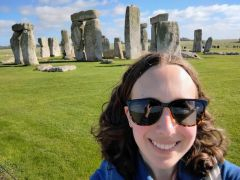
Lena Pickering, Sewanee: The University of the South, Fall 2025
Choosing the Middlebury-CMRS Oxford Humanities program for my semester abroad was the best decision I have ever made. Going to England was a dream of mine for quite some time, and when I arrived in Oxford, I found that it was everything I had dreamed of and more. Before participating in the CMRS program, I had been intimidated by the concept of working one-on-one with a tutor. However, once I began my studies, the one-on-one supervision became one of my favorite things about the program. My tutors all shared my enthusiasm for the subjects they taught, and they enabled me to hone my skills in research, critical thinking, and writing. I found myself challenged academically more than I had ever been before, in a way that invigorated me and solidified my determination to become a scholar.
In addition to my studies, I found several other ways to fall in love with Oxford, and with England as a whole. A few friends and I volunteered at Keble Chapel almost every Sunday, as well as at their services throughout the week. This proved to be an amazing way to meet all kinds of people–Oxford students, chapel staff, and students from other American universities. In addition, I joined the C. S. Lewis Society, and went to Evensong at several different Oxford colleges. I also tried out rowing and, though I did not stick with it, I will always treasure my memories of rowing along the Thames River at sunrise (there were even swans on the water!). And finally, though my coursework was intensive, I was able to use many of my weekends to travel around England, in addition to several field trips led by the wonderful and supportive CMRS staff.
All in all, my time at Oxford was transformative, both intellectually and emotionally. Since coming back, I have found that I have gained valuable perspectives on both my own culture and English culture, as well as confidence in my abilities, both academic and otherwise. I whole-heartedly recommend this program to anyone considering it, though they should be warned that, should they choose to participate, their life might be changed completely.
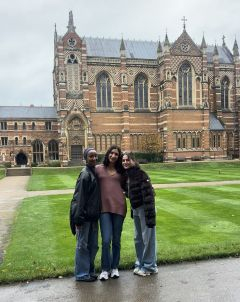
Yumnah Elshaar, Middlebury College, Fall 2025
I still think about the golden leaves that speckled ancient quads in Autumn at Oxford, the red-brick facade of Keble College, and how quickly that city came to feel like home. I arrived in the city not sure what to expect and left with a transformed sense of what I was capable of as a student and as a person.
The physical environment of Oxford is striking in a way that remains extraordinary. Walking past the Radcliffe Camera on my way to tutorials, I was constantly reminded that these were the same cobblestones that scholars have gathered on for centuries. The city’s architecture – its spires, stones, and chapels – became more than just a beautiful backdrop. I began my first tutorial titled “Gothic Art and Architecture.” I read the language of the crossed ribbed vaulting, and stories told through stained glass. The chapels’ doorways and structures began to open up to me, absorbing tales told through the sculpted figures arranged there. These buildings gave me a new admiration for what surrounded me every day, and I found myself recognizing the same architectural vocabulary scattered throughout my visits to London and its historic churches.
Middlebury’s CMRS program pushed me well beyond my comfort zone. I came to Oxford as a student of creative writing and neuroscience, fields I knew well. What I did not know was the growth in disciplines entirely new to me. I challenged myself in writing historical research papers, studying art and architecture, and psychoanalyzing British children’s literature. Learning to succeed in unfamiliar disciplines was transformative. Meeting one-on-one with expert professors created a level of accountability and mentorship not found in a traditional classroom. Their commitment to and interest in my growth and success made them particularly special. The accelerated nature of the program forced improvement in my writing and forged relationships that extended beyond just academic feedback.
Outside of academics, Oxford offered plenty of opportunities to recharge. Conveniently nestled in the city centre, charming streets decorated with shops, grocery stores, and university parks were all just a walk away. Port Meadow’s open fields were a safe haven for picnics and beautiful sunsets in the presence of wild horses and cows. The diverse food scene also introduced me to international cuisines. A particular study break ritual became late night visits to the kebab trucks with my friends. I am forever grateful for the guidance and company of the M-CMRS staff, and to Oxford for expanding my intellectual curiosity and giving me the experience of a lifetime.
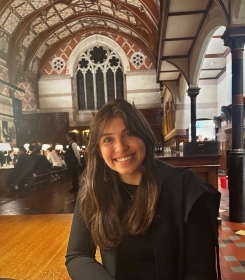
Mia Powell, WashU, Spring 2025
The Oxford spires do, in fact, dream. Choosing to study in this special city was the best decision I have made for myself, despite nearly ignoring the opportunity when it was first pitched to me. Having never left the U.S. (or the Midwest for more than a few days), I was unsure if I would enjoy uprooting my academic experience and temporarily planting it somewhere else. However, once I did, I grew in ways I never could have imagined. During my first semester (known there as Michaelmas term), a combination of the many academic and social facets of this program quickly made me realize that I was both capable of this experience and had the obligation to hold onto it for as long as possible. With so much more to learn and so many more people to meet, I approached the incredibly heartfelt and welcoming M-CMRS staff, who immediately welcomed me to return for the rest of the academic year. This year was filled with my most cherished memories, a plethora of lessons, and a complete transformation of my scholarly identity.
The academic elements of this program are truly special. Its small cohorts and abundant resources provide students with an opportunity to fully immerse themselves in the subjects of their choosing. The tutorial system was what first sparked my desire to attend this program, and my time partaking in those said tutorials proved that inclination to be immensely well placed. I genuinely cannot express the benefits of meeting one-on-one, day after day, alongside some of the most brilliant scholars in my field, with the shared focus of improving my capacity for critical thinking and research. My writing improved faster than ever, and my inspiration only continued to grow. As a student with CMRS, you will have access to centuries-old libraries, endless scholarship, and an academic staff constantly looking to help you grow academically and personally. I left Oxford both with new knowledge and new professional relationships with academics who do not hesitate to help guide and support me, even from over 4,000 miles away.
Adjoined with my unbelievable academic experience was an unforgettable social life that the M-CMRS Oxford Humanities Program encouraged: a social life oriented around the shared values of intellectualism, community, and good-old, nonsensical fun. Within Keble College, CMRS students are welcomed into endless opportunities to partake in sports and clubs. The fine arts scene in Oxford is difficult to match and quickly came to define the contours of my weekly schedule. Whether attending a local opera, admiring the Gothic architecture, or hearing ancient choral music be sung in the most haunting chapels, I was struck by this city’s musical and visual allure. Fusing all these experiences together were some of the best people I have had the privilege of meeting, both inside and outside the program. Though we are no longer conversing and laughing beneath the (less than six-foot-tall) ceilings of fourteenth-century pubs, I remain in touch with brilliant, passionate friends I would have never otherwise met. Thanks to this program, I will continue to be the insufferable “study-abroad kid who never stops talking about their time overseas.” How could I not? It was, as I once heard, “stunningly beautiful.”
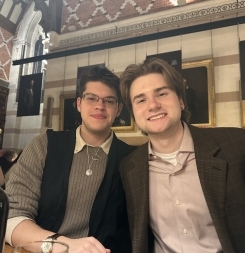
Mark McGoey, Middlebury College, Spring 2025
Oxford is a magical place. Over the course of Hilary Term (our spring semester) this past year, I grew in more ways than I could have imagined at the start of my Oxford experience. I met interesting, dedicated, and intensely knowledgeable students and tutors who were constant sources of inspiration, encouragement, and generosity. I explored ancient churches, libraries, streets, and of course, pubs. I saw parts of England I never would have been exposed to without the scheduled field trips, and was challenged academically in entirely new ways. More than anything, I learned much about my potential. In eight weeks I discovered and developed my abilities to rapidly conduct research on complex topics, formulate ideas, and write graceful, strong essays in the course of a week. I gained new confidence in public speaking and, most importantly, felt great joy in learning.
A key part of the study abroad experience is getting out of your comfort zone. When you enter a new place, far from home, there is an avalanche of the new and unfamiliar. I was initially intimidated by the prospect of tutorial classes – the one-on-one teaching method prevalent at Oxford. This fear was quickly replaced with excitement. It was an immense privilege and a great joy to spend time every week with world experts in ancient Greek and Roman art, colonial history, and the works of Shakespeare. Over the course of the semester, I became good friends with my tutors. Their guidance extended beyond precise writing advice and discussions of material as they gave restaurant suggestions and advice on weekend trip destinations. Living in Oxford invigorated my love for learning and helped me to forge deep connections with my instructors and fellow students.
The CMRS program does a fantastic job of welcoming you into what will inevitably become a second home. Living in St. Michael’s Hall was wonderful. While it is still very much a dorm building, its corridors, study rooms, and, in particular, the communal kitchen and common room (known as the JCR) were full of warmth. Communal meals, casual conversations, and study sessions were some of the everyday joys of living in such a lovely shared space. I grew closer to the friends I came into the semester with, and became close with those I met. The CMRS group as a whole was a vital part of my experience in Oxford. I greatly enjoyed becoming good friends with a number of Oxford students, but when differing schedules got in the way, I knew I had a strong home base to return to. Whether it was a night on the town or time spent discussing our essays, the time we spent was truly joyful. It is a truism of Oxford that the “people make the place.”
That being said, the place itself is truly breathtaking. Oxford’s numerous colleges and their individual quads, libraries, dining halls and chapels are absolutely stunning. It was such a treat to make friends at different colleges and see new, beautiful slices of life behind ancient, ivy-covered walls. Formal dinners, choir performances, regular lectures, and student play productions were all great ways to engage with Oxford students. Though each college has its own chapel, you don’t have to be religious to attend (in fact, most students are not). Keble’s chapel is stunning and the Chaplain, Father Max, is warm-hearted and extremely welcoming. Keble is also blessed with one of the best choirs in Oxford and hosts a weekly candle-lit choir service on Thursday evenings. These performances were a fantastic way to celebrate the (near) end of the week and were always followed by port and hot chocolate in the Keble College bar. Those Thursday evenings were just some of the many highlights of my Oxford experience.
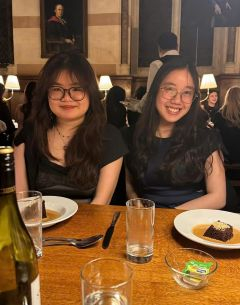
Ngoc Diep (Alice), Tulane University, Calendar Year 2025
It is so cliché to say, but I did fall in love with Oxford. Academically, Oxford did not let me down. I found myself falling in love with the books I had to read for the tutorials again and again, and I got excited about what I could write in my essay every day. I pushed my limits and proved I was worth more than I thought. The Middlebury Oxford CMRS Humanities staff are amazing; they are, in addition to being my academic inspiration, my second family. They took care of me at my worst academically and socially, and I enjoyed the times I got to sip tea and get to know them better. A lot of what I learned in Oxford, including the papers I wrote, the topics I discussed with my tutors, and the people I talked to, has really affected what I write in my honours thesis, what I present at conferences, what I publish, and my decision about graduate school.
Alongside my academic work, I joined a couple of societies at Oxford to make friends and stay “alive” amid all the academic work. In some societies, I took on active roles such as editing for The Oxford Blue and The OxStu, serving as Vice President of the Oxford Classics Society, Middlebury Oxford CMRS JCR, and organising the Short Film Festival (we invited the director of Harry Potter and the Goblet of Fire!). In others, I just hopped in and out whenever I had time, like studying Latin and going to talks and social events with Oxford Philosophy Society. I also enjoyed some “town” events and activities like going to the local comedy club on Saturdays! I grew an interest in stand-up comedy and found it a wonderful place to get to know more of Oxford “town” besides “gown”!
Lastly, I would borrow a line from my new favourite book, Katabasis: “There is more to life than academics!” It was at Oxford that I met many lifelong friends who ran after my train the day I left, studied with professors who changed [my life], and got to know interesting people simply by sitting next to them at the formals, whose lives were so inspiring. It was also at the Gloucester Green open market every Wednesday, where I got my favourite Pad Thai so often that the owner nearly adopted me! It was at the Kebab King every midnight, where I got my favourite peri peri Chicken with rice after submitting my weekly paper, so often that I no longer need to show my ID for a student discount. It was at Oxford that I tried out journalism for the first time and was nominated for Best Article at The OxStu for the most unhinged piece!
For those who plan to come to Oxford, do it. Study as hard as you can, live the most vibrant time, and make the decisions along the way that you will never regret. I hope you will love Oxford as much as I do.
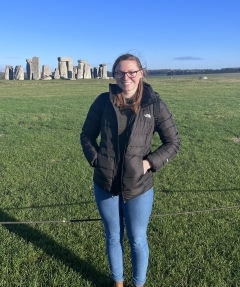
Amy Rinehard, Grinnell College, Spring 2024
I originally wanted to study abroad through the M-CMRS Oxford Humanities Program to connect with other undergraduates interested in the humanities, sharpen my academic and professional skills under the Oxford tutorial model, and to grow meaningfully as a human, learner, and philosophy major. M-CMRS empowered me to reach these aims and more in ways could never have imagined. The residence hall, St. Michael’s, is safely tucked in the heart of Oxford – a few turns out the door, and you can be on two of the main streets of the city! You’re close enough to hear and feel the buzz of Oxford, but removed enough to feel some space from city life. In a five-to-six-minute walk, you can reach five (yes, five!) different Oxford libraries, passing restaurants, pubs, shops, grocery stores, and bookstores on the way. I was certainly a “library hopper,” going to a new Oxford library at least once a week to see them all. The architecture of the city and university are astounding; sometimes you’ll be walking right next to a college and not even know it, so always keep an eye out for a college crest alongside the little details. Keble, the College M-CMRS is associated with, is gorgeous; take a couple minutes every time you go to the College to find a new architectural detail! There is so much to do and see in and around Oxford that you simply won’t be able to do it all. I would encourage anyone participating in the program to plan to do at least one nearby “tourist” activity per week; locally, I enjoyed running at Christ Church Meadow, trips to the Ashmolean Museum, and studying at Black Sheep Coffee.
Overall, I found the Oxford tutorial system freeing. You are truly evaluated for your effort and continual genuine, thoughtful engagement with material. Your tutorial papers are not like those in the US; instead of being a “culmination” of one’s learning, tutorial papers signify the beginning of it. This difference was best framed by the M-CMRS lead tutors’ analogy that these papers served as “snapshots of our thinking” that allow tutors to get a feel for where you are intellectually and contextually, and then move to individually challenge you as a thinker, person, and scholar. At points, it can be daunting to be so much more in charge of your learning, but it is certainly a skill that grows over time. It is exciting and enlightening to talk to other M-CMRS students about their classes, and especially to consider how topics overlap and apply across courses. The course and M-CMRS tutors are amazing - they want what is best for you and to do what they can to help you have a wonderful experience abroad. The M-CMRS tutors are right downstairs during the workday, and when they say you can come talk to them about anything at any point, they truly mean it!
One of the best parts of this program are the fellow students! It is so fun to live, learn, and adjust to studying abroad with other dedicated, intelligent individuals who have such an array of academic and personal backgrounds. I cherished conversations with friends while cooking and eating meals, and even if you don’t feel up to talking, you can simply enjoy the company and discussions of others in the Junior Common Room (JCR). You know the rigor of the program everyone is experiencing, and it is great to have each other as sounding boards, supporters, and second opinions. I also loved learning and hearing about everyone’s research topics; they truly display the depth, breadth, and curiosity of the group.
My quick advice would be: Join a sport or Keble-specific society to get to know Oxford students; your academic work may not always feel great in the moment, but it will ultimately get to where it needs to be; reach out to former M-CMRS students and use returners as a resource in the spring; attend all the cool activities M-CMRS provides. And, most importantly, especially in the harder moments – remember how lucky you are to be there.
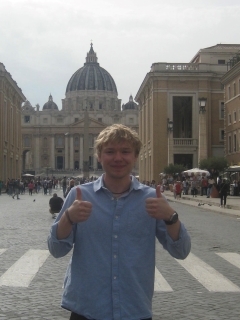
Asher Behmer, Reed College, Spring 2024
In the last weeks of the Middlebury-CMRS program, as I was applying the final touches to my research paper, I wrote in my journal that I “very nearly regretted” the whole thing. Of course, that was stress speaking through hyperbole; a dramatic statement that holds comically little truth about how I actually consider my time in Oxford. These days, that “very nearly” has become “absolutely and by no means at all,” and my Sophomore Spring with M-CMRS reigns as an unparalleled period of personal and academic growth.
It is difficult to write succinctly about Oxford. The acculturative stress and academics were a shock, to be sure, but the sort of shock that ripples into deep appreciation. The Oxford system provides a level of independence that is at once freeing and terrifying. You meet one-on-one with a tutor weekly, have considerable say in the topics that you study, the most extensive resources in the world with which to study them, and few set deadlines. This translates to an almost entirely self-directed academic experience: you are responsible for learning the Bodleian network, for finding and parsing the bulk of your sources, and for writing your papers on time. Of course, help is always there if you ask for it, but it rarely comes unsought. This autonomy was a highlight of my time with M-CMRS. It freed me to visit historic colleges and locations, attend lectures, student performances, and formal events, and experience Oxford’s considerable nightlife. But it is also the great challenge of the program. There is less than no one looking over your shoulder and telling you what to do and when to do it. It is easy to sink into this freedom. If you manage to master it, though, you will come out the other side a far more adept scholar and confident person.
That said, it is the memories that stick with me the most. I am certainly grateful for all that the program taught me, all the myriad ways I evolved by participating in it—the invaluable research experience and personal confidence—but the things I did in my free time, those particularly “Oxford” experiences, are what remain with me: it is the joy of waiting in line outside the Radcliffe Camera at 9:00AM with a friend, laughing in cold, white puffs about the “nerd snake” we were the head of; it is eating Five Guys on the lecture-hall floor while 3,000 words into a paper due the next morning; it is wearing a rented suit and playing laser-tag at the Oxford Union; it is my advisor telling me to take a pilgrimage and then me walking an hour and a half to lay my pen down at Tolkien’s grave; it is playing cards for seven hours and across three different pubs because writing has become impossible, because we are all too exhausted for anything beyond one more game of Hearts. These are the things that I carried home with me in my suitcase, the things I place on a high shelf above the novels and notebooks that accompanied them. These and the people.
There is a certain camaraderie among the M-CMRS students, regardless of the school or state they have traveled from. The sort of thing best seen in a late night Super Bowl watch-party, themed pub crawls, and common room karaoke sessions. It sits at the core of all my most favorite memories—the people I ate with, drank with, traveled with, and dealt cards too—and is particular to M-CMRS. There must be something in the air at Saint Michael’s Hall, something that made these experiences possible, something that I cannot imagine myself without and cannot recommend enough. There will certainly be points where you very nearly regret it. But they are small, dwarfed by how you will by no means at all forget a moment of it.
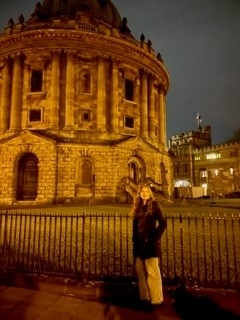
Camryn Brielmann, Middlebury College, Academic Year 2023-24
Even after attending the both the Museum Studies program and spending the academic year in the Middlebury CMRS Oxford program, I never lost the feeling of wonder walking up to the Radcliffe Camera, one of Oxford’s many libraries. The Rad Cam is perhaps one of the most iconic buildings in the city of Oxford; the beautiful dome can be found on souvenir products across the city, and there was always a line of tourists outside taking pictures, no matter the weather. As an M-CMRS student, not only was I lucky enough to enter the building, but I also had the privilege of spending dozens of hours inside reading sources, writing my papers, and occasionally taking a twenty-minute nap; it quickly became my favorite place to study, and perhaps my favorite building in the city.
I first arrived Oxford as part of the Museum Studies program, the summer after my first year. To say I had a fantastic time would be an understatement—I immediately fell in love with the city of Oxford. As a history major, walking through the streets lined with medieval buildings, seeing the many spires of the colleges from my dorm room, and experiencing the atmosphere of one of the world’s oldest universities felt like something from a dream. Through the program, I was able to learn a great deal not just about museums, but also about England’s history. With trips to everywhere from stately country homes to modern art museums, I felt like in the four weeks I was there, I had been introduced to an incredible amount of information about how museums were run and what a career in the British heritage sector might look like. And yet, four weeks was not enough. Before I had even returned to the States, I knew that I wanted to go back.
Of course, spending the academic year in the Middlebury CMRS program was very different than the month-long Museum Studies Program. Academically, the Oxford program was extremely rigorous. The amount of research and writing required at times felt difficult to achieve, but by the end of it, I felt I was a much more confident and adept scholar. It helped that I was at Oxford University, with access to everything I needed to succeed as a student. The Bodleian Libraries had every book I could possibly need and then some, my tutors were experts in their fields, and the faculty of the CMRS program were friendly and helpful. During my second research paper, my advisor arranged for me to see original copies of the primary sources I was looking at—Christ Church College had one of the few surviving originals, and I was able to flip through its pages. Such an opportunity was only possible because I was at Oxford University.
My favorite part of the academics at Oxford was the tutorial system. At first, the idea of meeting with a tutor one on one seemed daunting. Nevertheless, it was through the tutorials that I saw the most improvement in my writing and research skills. The tutorials, besides acting as an eight week essay-writing bootcamp, gave me the opportunity to study topics in very unique ways. For example, my first semester, I took Art of the Garden, a tutorial that sent me to visit gardens around Oxford and nearby country estates. My mini day trips to various gardens were something I looked forward to every week and serve as a good example of how the tutorial system was uniquely designed to fit my interests, while also providing me with unique academic opportunities.
Besides the academics, the Oxford program offers many things to do outside the classroom. Through the program, I had access to the wide range of Oxford University’s many clubs and organizations. Like many other students from my cohort, I joined the Oxford Union, through which I was able to attend debates and lectures with notable speakers such as Tom Hanks. The Union also had a variety of social events, and the two balls were a highlight of my year. The community among fellow CMRS students was another highlight—during the Museum Studies Program and both semesters, I was able to meet people who I now consider to be some of the best friends I have made in college. Whether it was dressing up to go to a formal dinner at Keble College, playing cards in a pub to procrastinate working on our research papers, or getting into a debate about how many of us it would take to defeat a fully armed Norman Crusader (eventually, with some input from our Crusaders seminar tutor, we determined the answer to be ‘a lot’), the people I met and the things we experienced together is what made the Middlebury CMRS Oxford program a truly special experience.
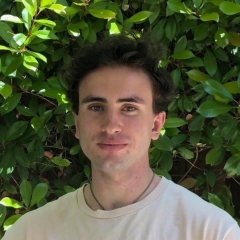
JP Conrad, Colgate University, Academic Year 2023-24
As a student from a small liberal arts university, the Middlebury CMRS Oxford program was my ticket to maximal academic freedom where I could read and learn about everything I ever wanted, guided by the most kind and knowledgeable tutors I could ask for. M-CMRS provides students with a tremendous academic opportunity, benefitting from Oxford tutors who possess first class expertise in their subjects. Most students will likely find that the difference in the efficiency and quality of their academic work by the end of the program is night and day. Whether you study at RadCam, the Old Bodleian, or one of the other many beautiful faculty libraries, the environment in Oxford is always conducive to excellent work. The amount of resources available to you through the Bodleian system is unparalleled. Everyone on the faculty of the M-CMRS program is completely approachable, supportive, and a tremendous source of knowledge. If you are considering applying, I can attest that my M-CMRS experience was a 10/10 and absolutely worth pursuing.
Between clubs, sports, the Oxford Union, and living in the heart of downtown Oxford, it is much easier than you might expect to integrate yourself into Oxford student life. Turf Tavern, the White Rabbit, Spoons Four Candles, and Turtle Bay are some of the best spots to go that students from all the Oxford colleges know about and frequent, especially on Wednesday and Thursday nights when crewdates and club promotionals are most common. Oxford students are very active and friendly towards Americans. It definitely helps having two terms to facilitate those connections and I would have loved to be back for the Trinity term as well. My two big recommendations are to join the Keble football team and take advantage of formal dinners. Contrary to American biases, English food is good—especially if you eat at Keble, the best dining hall in Oxford.
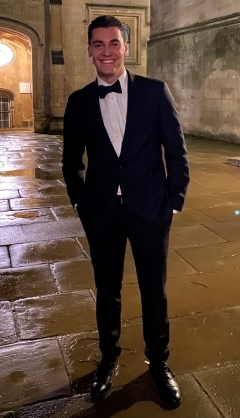
David Porges, Middlebury College, Academic Year 2023-24
I think the best way to describe my time in Oxford is to first admit I did not plan on staying a full year. When walking into CMRS at the start of Michaelmas (fall) term, I had envisioned three months of academic rigor that would focus on improving my skills as a writer and researcher. While this experience happened and I learned a great deal from my tutors, it was the relationships I made with Oxford, as a community and as a place, that led me to extend my time and spend a full two terms in Oxford.
Academically, the tutorial system fitted my style of learning and enabled me to learn through the exploration of ideas rather than through a set syllabus. Each lesson offered me the opportunity to ask a question or broach a topic of discussion that did not fit into the strict outline of our course work. These tutorials were eight weeks allowing a true working relationship to be developed with the tutors. When building this relationship, tutor and student were able to build on mutual passions for the subject organically throughout the eight weeks. This organic style of teaching is something I am grateful to have experienced while at Oxford and highly recommend it to anyone who enjoys that kind of learning.
Socially, Oxford is what you make of it. Critical to understanding the social scene is the utilization of Oxford’s many, many clubs, and organizations. Coming from a smaller school like Middlebury, it was refreshing to see such a diverse and wide range of clubs and organizations at a larger school. What is even more exciting is how invested Oxford students are in meeting you and engaging with you. I joined the Oxford Union, the Harris Law Society, and partook in the Oxford Lancers American football team. All three of these programs enabled me to blend into the social fabric of Oxford and gave me the opportunity to make friends outside of the abroad cohort.
While Oxford is truly a remarkable city that I loved spending time in, being able to explore the rest of the UK and continental Europe was amazing. With a numbers of Middlebury students around Europe in different programs, it enabled me to have an opportunity to visit friends with local knowledge everywhere I went. On one trip to Lisbon a fellow CMRS friend and I were both stopped in the middle of the street by three of our friends at another Middlebury Schools Abroad. The academic freedom to explore subjects naturally, the gift of being able to weave myself with ease into the social world of Oxford and the ability to travel and be connected to fellow abroad students around Europe made Oxford an incredible experience
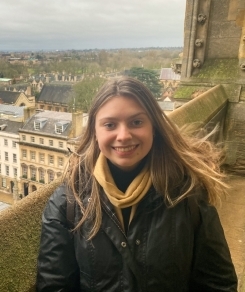
Isabelle Job, Bates College, Spring 2023
Oxford, also known as the “The City of Dreaming Spires,” is a truly magical place. I studied in Oxford for my Junior Winter semester abroad and returned in the summer for the Middlebury Museum Studies in Oxford program. Participating in both programs allowed me to explore my academic interests inside and outside the classroom while spending time in Oxford, London, and beyond.
During the Winter semester (or Hilary Term), I participated in Oxford’s tutorial system by taking two classes relating to my area of interest, art history. During my tutorial classes, I met one-on-one with Oxford-based tutors (or Dons) who catered each course to my individual interests. I made valuable connections with these tutors and with their guidance, I had the opportunity to look at old manuscript books in Oxford collections. These tutorials also taught me how to effectively write and research in a short period of time. While exploring such fascinating topics with Oxford tutors, experts in their field of study, you fully immerse yourself in the subject matter making you feel like a true scholar!
While the academics at Oxford are rigorous, there are many things to do outside of the classroom. I immersed myself in the Oxford student body by joining societies, such as the Tea Society, and attending speaker events at the world-renowned Oxford Union. I also attended Oxford’s annual balls, formal hall dinners, Keble College JCR events, and an art history lecture series. During a typical day, I explored Oxford by roaming the ancient streets, visiting the colleges, learning in museums, or enjoying an afternoon tea or coffee in one of Oxford’s many cafés. Every day I would choose one of the many libraries the university has to offer for my study sessions. My favorite library is the Radcliffe Camera, most often called the ‘Rad Cam.’ I spent many days studying in the Rad Cam or exploring the Gladstone Link looking for books. Finding a new book in an Oxford library often feels like a quest for a hidden treasure!
My time in Oxford participating in the Middlebury-CMRS semester and Museum Studies program was very influential during my college experience. If you are a student who loves to learn in an ancient city environment where you can explore anything that interests you, Oxford is the perfect place for you!
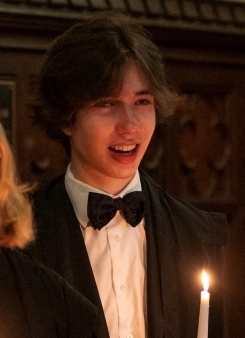
Sam Habib, Middlebury College, Academic Year 2022-23
An absolute dream. Yes, I know it’s stereotypical to say that of a place like Oxford, but it could not be more accurate. Participating in the M-CMRS program was one of the best decisions I made as a student and a person.
Starting with the student side, the program bolsters your academic independence through their one-on-one tutorials, primarily their seminar and research papers. I chose to go to Oxford as a sophomore and was the only one in the cohort in any class of 2025. This set me apart from my peers as I had less academic and life experience than them. However, the incredible M-CMRS staff were accommodating and constantly aware of my academic level, with the academic committee considering that when moderating my grades. The individualized style of the program was primarily a shock to me at first, barely coming out of my first year and being thrust into a paper I had to write by myself. Even though it felt like sink or swim, my supervisor (and the M-CMRS Principal) was always able to help me, the slightly too-fresh sophomore. The first paper I wrote there was even accepted a couple of conferences, and I got a conference abstract published out of it, something I never would have dreamed of while I was a freshman. Incredibly impressive of the M-CMRS staff was how they catered to my (and many other students’) special interests. I was concerned going in that the course would be Eurocentric; however, I was able to write both of my research papers on Islamic and Middle Eastern cultures, take a class on the Crusades, and the M-CMRS even created a particular history tutorial for me on the Lebanese Civil War! It can be tough to jump into a more individual learning style, mainly when used to the US teaching style, but the experience will develop you as a student and person.
Outside the cozy confines of St. Michaels Hall (the M-CMRS building), Oxford had much to offer. I was lucky enough to be able to join the Harris Manchester College Choir, another college part of the University of Oxford. I found a community of friends and even made a couple of college besties there. While it was outside Keble and utterly separate from the cohort of study abroad students with me, it was amazing to make connections outside of my college bubble. It was saddening to see that many students did not join societies, clubs or teams within the University of Oxford. However, if you want the complete experience Oxford can offer, it is necessary to do that! My college choir gave me free formal dinners every week, so I had the lovely excuse to get dressed up and walk over to Harris Manchester with a bottle of wine in hand.
Besides college choir, I got up to a lot of other fun in Oxford. My friends and I, inside and outside M-CMRS, would regularly go out and experience Oxford’s nightlife. The city offers a lovely assortment of pubs and a few clubs for those who wish to partake. However, the cafes around Oxford provide excellent daytime hang-out spots and usually a decent cup of coffee, too. Or I’d get up to something more exciting by climbing into a boat and punting to celebrate a completed paper or exam with my friends! Oxford is your oyster, and it is up to you to get out there and explore all it has to offer. It can seem daunting, especially if you have not been outside the US or have never visited the UK before, but putting yourself out into Oxford will allow you to enjoy it properly.
So, overall, I can’t recommend the M-CMRS program enough; it is packed with excellent academic staff and a host of opportunities for us students to get out into Oxford and meet amazing people. I have become a better student through this program and, hopefully, a bit of a better person, too!
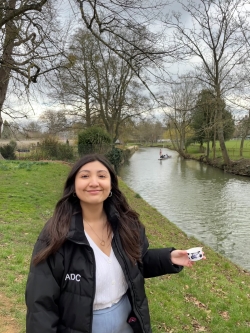
Alyssa Cruz, University of San Francisco, Spring 2022
Imagine waking up every day and making an important decision: which library should I visit today?
Oxford is not a big city. It’s crammed with libraries, colleges, coffee shops, and small stores. It’s full of aspiring academics, high achievers, and dreamers. It’s a world of its own. My time at Oxford was marked by days spent at the library- hearing the collective sighs of students-, day trips to nearby cities, and rehearsals. I played the roles of model and tourist in a production by the Oxford University Light Entertainment Societies (OULES). I attended several college dining halls and met students from all over the UK. Occasionally, we would venture out to cake shops, Port Meadow, or late-night McDonalds runs. For anyone planning on applying to the program or awaiting their arrival date, I highly recommend researching and joining one or two societies (clubs) early on in the term. It is an excellent opportunity to meet students and hear their recommendations for the best kebab food truck in town.
While the city and university have a lot to offer, there were times when I felt lonely. Oxford is an academically challenging institution, but it is definitely not known for its diversity. Finding your group can be difficult. Ninety-nine percent of the time I was the only Hispanic in the room. This should not be a deterrence. In fact, I became more introspective and culturally aware of the country and city I was in. In more ways than one, Oxford was a once-in-a-lifetime experience. It truly was a wonderful program and a privilege to walk those streets, enrich my knowledge, and grow as a person.
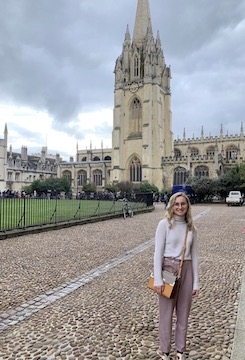
Rebecca Leppert, George Washington University, Academic Year 2019-2020
There is something inexplicably magical about studying in Oxford. I grew to love the city and the University’s inspiring spirit of academic curiosity during my time at CMRS –– so much, in fact, that I decided to return to the program for a second term.
I was humbled and excited to learn in a city with some of the world’s brightest minds. The tutorial system offered an unparalleled learning experience with expert instruction from Oxford tutors and CMRS staff. My courses were intellectually stimulating, pushing me to think critically and mature as a writer. Yet scholastic pursuit often continued outside the classroom in Oxford. I appreciated the unique opportunities to attend my tutor’s film screening on the mystical-theologian Hadewijch and to visit St. Frideswide’s shrine at Christ Church with my medieval monasticism tutor.
While I spent many hours befriending books inside the stunning RadCam or rummaging for sources in the Bodleian underbelly (aka the Gladstone Links), I explored the city beyond the Radcliffe Square hub. Sunny days were best spent with friends punting along the River Cherwell, picnicking in University Parks, and trekking through Port Meadows to enjoy the cozy Trout Inn Pub. Oxmas dinner, touring the Oxford University Press, and watching Prince William open Keble’s new H B Allen Centre were a few highlights of my unforgettable Oxford experience. I collected train ticket stubs from trips around the UK to Edinburgh, Bath, Norwich, Highclere Castle, and, of course, London! CMRS also organized field trips to places like Stonehenge and Stratford-upon-Avon.
At the end of the day, I was happy to return to the comfort of the JCR community where we made meals and shared game nights together. I cherished my year in dear Oxford and am grateful to have called this city and St. Michael’s Hall my home abroad.
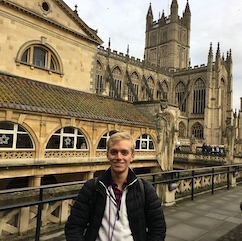
Ben Beese, Middlebury College, Academic Year 2019-2020
A typical day starts with breakfast, quietly watching the sun rise between the various “dreaming spires.” After some beans on toast, I quickly make my way past no less than four colleges and a 300-year-old market (good for fancy chocolates and cheese) to the Bodleian Library, a repository of nearly every book published in English and a fair amount of students’ tears. A morning of reading Hegel ends in time for a quick lunch before rushing down High Street to Queen’s College (a personal favorite, architecturally) to discuss my latest essay with my tutor.
There’s no way to generalize what a tutorial looks like but it’s always some mix of terror and exhilaration. Tutors tease the week’s lesson out of you through careful questioning. You place your ideas on the table and your tutor critiques here, encourages there, and helps you place them in a respectable academic context. A class fails or succeeds on your willingness to play with the ideas in your readings. Oftentimes, a tutorial leaves me drained which is more than enough of an excuse for a cup of tea or coffee at one of the countless, brilliant coffee shops. I’ll start my next paper while caffeinating.
Dinnertime in the CMRS common room is a mélange of varying culinary talents and overlapping conversations about medieval eschatology, Viking epics, literary theory, or God knows what else. Conversations will travel late into the night unless interrupted by a movie, a pub trip, or pure exhaustion.
This schedule is regularly broken by newspaper lay-ins, church breakfasts, parties, day trips across the country, formal dinners at Keble, and much else. From the city (consisting almost entirely of cafes, gardens, and bookstores), to the people (as friendly and encouraging as anyone I’ve met), Oxford isthe perfect place to embrace your inner intellectual.
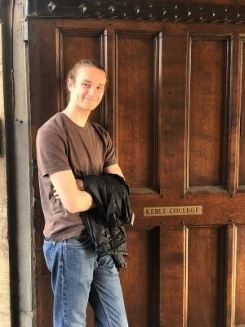
Bennett Pienkowski, Middlebury College, Academic Year 2018-2019
It seems wise to be critical, or at least aware, of the social, intellectual, and even physical ‘bubbles’ that we build in our lives. That being said, my time at CMRS in Oxford has helped me to appreciate the other side of this proverbial coin. Bubbles can also allow for otherwise impossible experiences and educational opportunities.
Oxford is a city and a university filled with professional academics and brilliant students all deeply committed to every possible field of study. Most mornings, afternoons, and evenings offer the chance to attend lectures by some of the world’s most influential thinkers, business leaders, and politicians. In terms of pedagogy, Oxford’s hallmark is the tutorial system whereby students engage with instructors in weekly one-on-one meetings. It’s hard to imagine just how stimulating, difficult, and rewarding this class-structure is. The first time one of your essays is analytically torn to shreds, it is incredibly jarring, but when you come to realize just how effective the experience was at helping you to uncover the flaws in your thought processes and argumentation, you don’t want education to take any other form.
Middlebury’s CMRS program is entirely devoted to the humanities, located in a quirky building at the very heart of the city-center, and staffed by professionals well-versed not only in their respective fields but in the precarious art of British wit. You spend a lot of time with your fellow CMRS students, certainly more of a blessing than a curse, and you have access to an in-house library that contains the most essential volumes of early western literature and theory. The culture of CMRS is nicely captured by the image of students checking out Machiavelli or The Song of Roland while bleary-eyed and still in their pajamas, an amusingly frequent occurrence.
There are plenty of distinguishing aspects of the place that have gone unmentioned: the architecture, the ubiquitous attention to history, the unparalleled Bodleian library system, to name just a few. Even so, I think it is fair to say that Oxford and CMRS are indeed bubbles. I would encourage anyone to go and find out just what formative, engaging, and ultimately indispensable places bubbles can be.
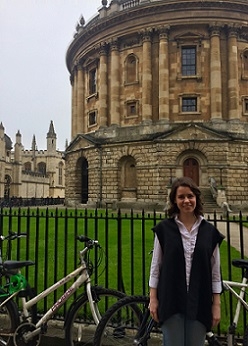
Amanda Westcott, St. Olaf College, Spring 2018
My time studying in the city of “dreaming spires” is difficult to summarize in just a few hundred words. I was amazed by Oxford’s wonderful assortment of people and buildings, young and old, both modern and ancient – like a large outdoor museum! Moreover, my experiences with peers and tutors were very memorable.
I quickly realized what a welcoming community of learners I had joined – from Middlebury and all over the world. The program was close-knit and had a lively Facebook group that shared invitations to lectures, pub quizzes, and afternoon teas. St. Michael’s Hall supported a cozy atmosphere with kind faculty and the occasional late-night essay-writing session. But, I was always in the company of friends who were also writing essays and willing to take breaks to hit up the closest food truck with me. (Posh Nosh has amazing curry fries, by the way.)
Though the academics were demanding, I could take courses for my major and also indulge other interests, such as English literature. Tutorials were challenging but friendly environments where I conversed freely about the readings and improved my writing skills.
On top of that, I attended weekly rehearsals and performed every Sunday Evensong for Brasenose Chapel Choir. We would normally have dinner together each week, too. These are not your average dining halls, either. I also spent many a brunch with friends in the Keble dining hall, marveling at the long tables and tall, decorated ceiling, as well as the traditional English breakfast in front of me.
I traveled outside of Oxford, too, and took a few trips to places like Edinburgh, Cardiff, Blenheim Palace, and Highclere Castle. CMRS organized additional day-trips, and together, we toured Windsor Castle, saw Twelfth Night in Stratford, and visited Wells Cathedral.
I loved my semester abroad – so much so that I’m returning for the summer Museum Studies program. There is so much more I could describe but suffice to say it was a rewarding experience… one of many dreams among the “dreaming spires.”
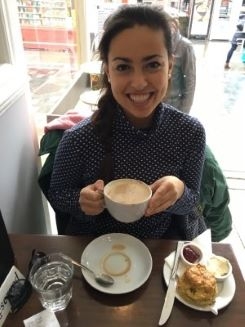
Jacqueline Moruzzi, Washington & Lee University, Spring 2017
“I wonder anybody does anything at Oxford but dream and remember, the place is so beautiful.” W.B.Yeats
While I can attest that I did more there than just dream, Yeats’s words capture the wonder of the city. Upon my arrival, I was immediately struck by its beauty; it is architecturally stunning. Its aesthetic loveliness roused me from my jet-lag on the bus there from the airport. In days and weeks after, I learned more about the fascinating culture and ambiance of the city. In addition to my gratitude for being in such an aesthetically and culturally rich place, I was thankful for CMRS and the opportunities in which I was able to partake. I joined the social running club and happily made friends both within and outside of the program through running. Academically, the workload was rigorous and demanding. At first, many of us were intimidated; however, the kind faculty assured us that we were all capable of handling it and should we need any guidance or advice, they were always there to help. I found both to be true. I am so grateful for the opportunity to partake in a very different academic structure and culture from that which students are used to in American universities. My home institution doesn’t offer courses in Celtic studies, so the opportunity to have ‘Celtic Middle Ages’ as one of my tutorials was wonderful! I enjoyed spending hours reading about the week’s topic and my tutor was very knowledgeable and engaging. Overall, even if I were to write an entire paper on my time in Oxford at CMRS, it would not be sufficient: I’m not sure I would be able to adequately express how wonderful my time there was in every respect.
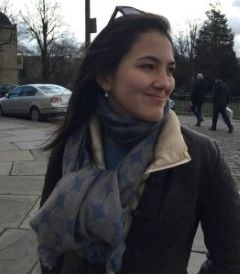
Mia Guild, Wellesley College, Academic Year 2014-15
It’s 9am and I stroll to the Radcliff Camera to begin my tutorial readings. The narrow cobblestone streets are nestled in between limestone, gothic colleges as the morning light kisses the tress in the colleges’ gardens. My time in the library is focused as I delve into John Locke’s Treatises of Government. Last week it was Hobbes’s Leviathan. The Rad Cam is my favorite place to study. The natural light brightens the room, highlighting the beautiful architectural details of the domed ceiling. There’s a sense that many leaders, thinkers, and writers-as students- spent hours in this centuries-old space enthralled by the leather bound books.
I take my study break at Vaults & Gardens, a café nestled under the University Church. The café’ is in Oxford University’s first listed Old congregation house built in 1320 and serves the best cream tea.
I begin my paper carefully crafting an introduction because my tutor and I have been working on improving introductions in my papers. With Oxford’s writing intensive curriculum and the opportunity to work one-on-one with a tutor each week, my writing has improved ten-fold. A few days later I step foot in a tutorial. They can be intimidating but often they are engaging and challenging, exercising my brain in a new way. To me, what was most remarkable about the tutorial system was the personal relationships I developed with my tutors.
I have a busy afternoon and evening. I head to my field hockey match where Keble is playing in the Cupper’s final. I love the low-key, friendly competition between the 38 colleges and all the social events and activities that go hand with hand with college sport teams. That evening I’ve booked into formal dinner at Keble. Dinner is in Keble dining hall, with fully set long tables and ornate stained-glass windows. After I get together with friends from CMRS, Keble, and new friends from other American college and maybe begin a pub-hop. Oxford is full of old pubs, each of which has their own history, stories, personality, and specialty.
As I reflect on my time at Oxford, I write this with nostalgia but also with a tremendous sense of accomplishment. At Oxford I became more confident. I grew as a student. I met new people, friends, and mentors. My time at Oxford helped me realize what my strengths were. My time was full of growth, adventure, and experiences.
